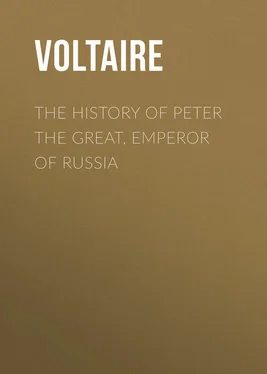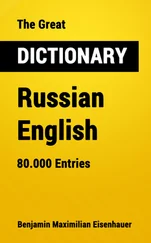Voltaire - The History of Peter the Great, Emperor of Russia
Здесь есть возможность читать онлайн «Voltaire - The History of Peter the Great, Emperor of Russia» — ознакомительный отрывок электронной книги совершенно бесплатно, а после прочтения отрывка купить полную версию. В некоторых случаях можно слушать аудио, скачать через торрент в формате fb2 и присутствует краткое содержание. Жанр: История, literature_18, foreign_prose, на английском языке. Описание произведения, (предисловие) а так же отзывы посетителей доступны на портале библиотеки ЛибКат.
- Название:The History of Peter the Great, Emperor of Russia
- Автор:
- Жанр:
- Год:неизвестен
- ISBN:нет данных
- Рейтинг книги:3 / 5. Голосов: 1
-
Избранное:Добавить в избранное
- Отзывы:
-
Ваша оценка:
- 60
- 1
- 2
- 3
- 4
- 5
The History of Peter the Great, Emperor of Russia: краткое содержание, описание и аннотация
Предлагаем к чтению аннотацию, описание, краткое содержание или предисловие (зависит от того, что написал сам автор книги «The History of Peter the Great, Emperor of Russia»). Если вы не нашли необходимую информацию о книге — напишите в комментариях, мы постараемся отыскать её.
The History of Peter the Great, Emperor of Russia — читать онлайн ознакомительный отрывок
Ниже представлен текст книги, разбитый по страницам. Система сохранения места последней прочитанной страницы, позволяет с удобством читать онлайн бесплатно книгу «The History of Peter the Great, Emperor of Russia», без необходимости каждый раз заново искать на чём Вы остановились. Поставьте закладку, и сможете в любой момент перейти на страницу, на которой закончили чтение.
Интервал:
Закладка:
Voltaire
The History of Peter the Great, Emperor of Russia
CHAP. I
DESCRIPTION OF RUSSIA.
The empire of Russia is the largest in the whole globe, extending from west to east upwards of two thousand common leagues of France, 1 1 A French league contains three English miles.
and about eight hundred in its greatest breadth from north to south. It borders upon Poland and the Frozen Sea, and joins to Sweden and China. Its length from the island of Dago, in the westernmost part of Livonia, to its most eastern limits, takes in near one hundred and seventy degrees, so that when it is noon in the western parts of the empire, it is nearly midnight in the eastern. Its breadth from north to south is three thousand six hundred wersts, which make eight hundred and fifty of our common French leagues.
The limits of this country were so little known in the last century, that, in 1689, when it was reported, that the Chinese and the Russians were at war, and that in order to terminate their differences, the emperor Camhi on the one hand, and the czars Ivan or John, and Peter, on the other, had sent their ministers to meet an embassy within three hundred leagues of Pekin, on the frontiers of the two empires, the account was at first treated as a fiction.
The country now comprehended under the name of Russia, or the Russias, is of a greater extent than all the rest of Europe, or than ever the Roman empire was, or that of Darius subdued by Alexander; for it contains upwards of one million one hundred thousand square leagues. Neither the Roman empire, nor that of Alexander, contained more than five hundred and fifty thousand each; and there is not a kingdom in Europe the twelfth part so extensive as the Roman empire; but to make Russia as populous, as plentiful, and as well stored with towns as our southern countries, would require whole ages, and a race of monarchs such as Peter the Great.
The English ambassador, who resided at Petersburg in 1733, and who had been at Madrid, says, in his manuscript relation, that in Spain, which is the least populous state in Europe, there may be reckoned forty persons to every square mile, and in Russia not above five. We shall see in the second chapter, whether this minister was mistaken. Marshal Vauban, the greatest of engineers, and the best of citizens, computes, that, in France, every square mile contains two hundred inhabitants. These calculations are never very exact, but they serve to shew the amazing disproportion in the population of two different countries.
I shall observe here, that from Petersburg to Pekin, there is hardly one mountain to be met with in the route which the caravans might take through independent Tartary, and that from Petersburg to the north of France, by the road of Dantzic, Hamburg, and Amsterdam, there is not even a hill of any eminence to be seen. This observation leaves room to doubt of the truth of that theory, which makes the mountains to have been formed by the rolling of the waves of the sea, and supposes all that is at present dry land, to have been for a long time covered with water: but how comes it to pass, that the waves, which, according to the supposition, formed the Alps, the Pyrenees, and Mount Taurus, did not likewise form some eminence or hill from Normandy to China, which is a winding space of above three thousand leagues? Geography, thus considered, may furnish lights to natural philosophy, or at least give room for rational doubts.
Formerly we called Russia by the name of Muscovy, from the city of Moscow, the capital of that empire, and the residence of the grand dukes: but at present the ancient name of Russia prevails.
It is not my business in this place to inquire, why the countries from Smolensko, to the other side of Moscow, were called White Russia, or why Hubner gives it the name of Black, nor for what reason the government of Kiow should be named Red Russia.
It is very likely that Madies the Scythian, who made an irruption into Asia, near seven hundred years before our vulgar æra, might have carried his arms into these regions, as Gengis-Khan and Tamerlane did afterwards, and as probably others had done long before Madies. Every part of antiquity is not deserving of our inquiries; that of the Chinese, the Indians, the Persians, and the Egyptians, is ascertained from illustrious and interesting monuments; but these monuments suppose others of a far more ancient date, since it required many ages to teach men the art of transmitting their thoughts by permanent signs, and no less time was required to form a regular language; and yet we have no such monuments even in this polite part of Europe. The art of writing was a long time unknown to all the North: the patriarch Constantine, who wrote the history of Kiow in the Russian language, acknowledges, that the use of writing was not known in these countries in the fifth century.
Let others examine whether the Huns, the Slavi, and the Tartars, formerly led their wandering and famished tribes towards the source of the Boristhenes; 2 2 The Boristhenes, or Dnieper, is one of the largest rivers in Europe; it rises in the Walchonske Forest, runs through Lithuania, the country of the Zoporag Cossacks, and that of the Nagisch Tartars, and falls into the Black Sea near Oczakow. It has thirteen cataracts within a small distance.
my design is to shew what czar Peter created, and not to engage in a useless attempt, to clear up the chaos of antiquity. We should always keep in mind, that no family upon earth knows its first founder, and consequently, that no nation knows its first origin.
I use the name of Russians to designate the inhabitants of this great empire. That of Roxolanians, which was formerly given them, would indeed be more sonorous, but we shall conform to the custom of the language in which we write. News-papers and other memoirs have for some time used the word Russians; but as this name comes too near to that of Prussians, I shall abide by that of Russ, which almost all our writers have given them. Besides, it appeared to me, that the most extensive people on the earth ought to be known by some appellation that may distinguish them absolutely from all other nations. 3 3 The reader will easily perceive, that the whole of this paragraph relates only to the French language, for in English we make no such distinctions in the name of these people, but always call them Russians.
This empire is at present divided into sixteen large governments, that will one day be subdivided, when the northern and eastern countries come to be more inhabited.
These sixteen governments, which contain several immense provinces are the following: —
The nearest province to our part of the world is that of Livonia, one of the most fruitful in the whole North. In the twelfth century the inhabitants were pagans; at this time certain merchants of Bremen and Lubeck traded to this country, and a body of religious crusaders, called port-glaives , or sword-bearers, who were afterwards incorporated in the Teutonic order, made themselves masters of this province in the thirteenth century, at the time when the fury of the crusades armed the Christians against every one who was not of their religion. Albert, margrave of Brandenburg, grand-master of these religious conquerors, made himself sovereign of Livonia and of Brandenburg-Prussia, about the year 1514. From that time, the Russians and Poles began to dispute for the possession of this province. Soon afterwards it was invaded by the Swedes, and for a long while continued to be ravaged by these several powers. Gustavus Adolphus having conquered it, it was then ceded to the Swedes in 1660, by the famous treaty of Oliva; and, at length, czar Peter wrested it from these latter, as will be seen in the course of this history.
Читать дальшеИнтервал:
Закладка:
Похожие книги на «The History of Peter the Great, Emperor of Russia»
Представляем Вашему вниманию похожие книги на «The History of Peter the Great, Emperor of Russia» списком для выбора. Мы отобрали схожую по названию и смыслу литературу в надежде предоставить читателям больше вариантов отыскать новые, интересные, ещё непрочитанные произведения.
Обсуждение, отзывы о книге «The History of Peter the Great, Emperor of Russia» и просто собственные мнения читателей. Оставьте ваши комментарии, напишите, что Вы думаете о произведении, его смысле или главных героях. Укажите что конкретно понравилось, а что нет, и почему Вы так считаете.












